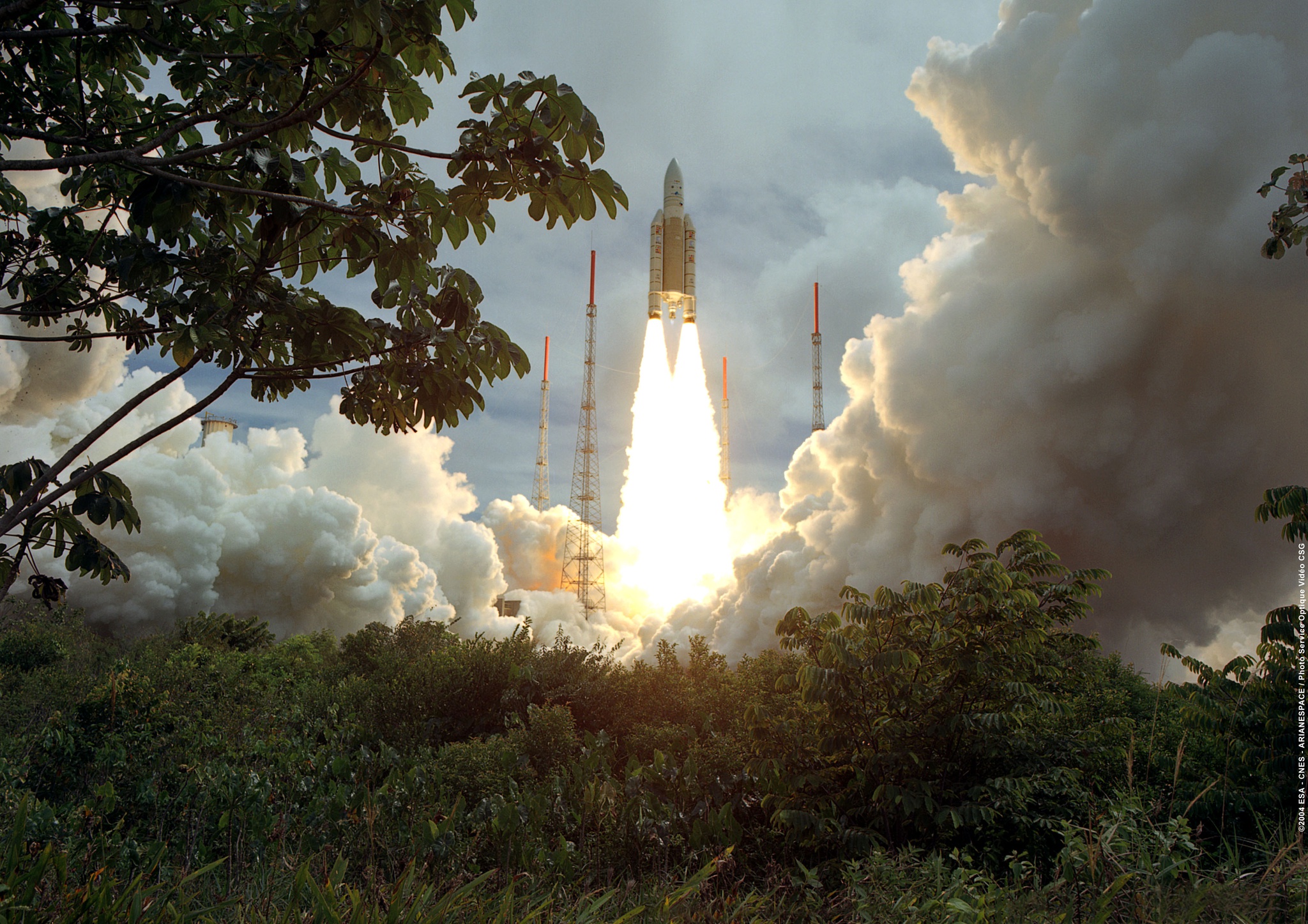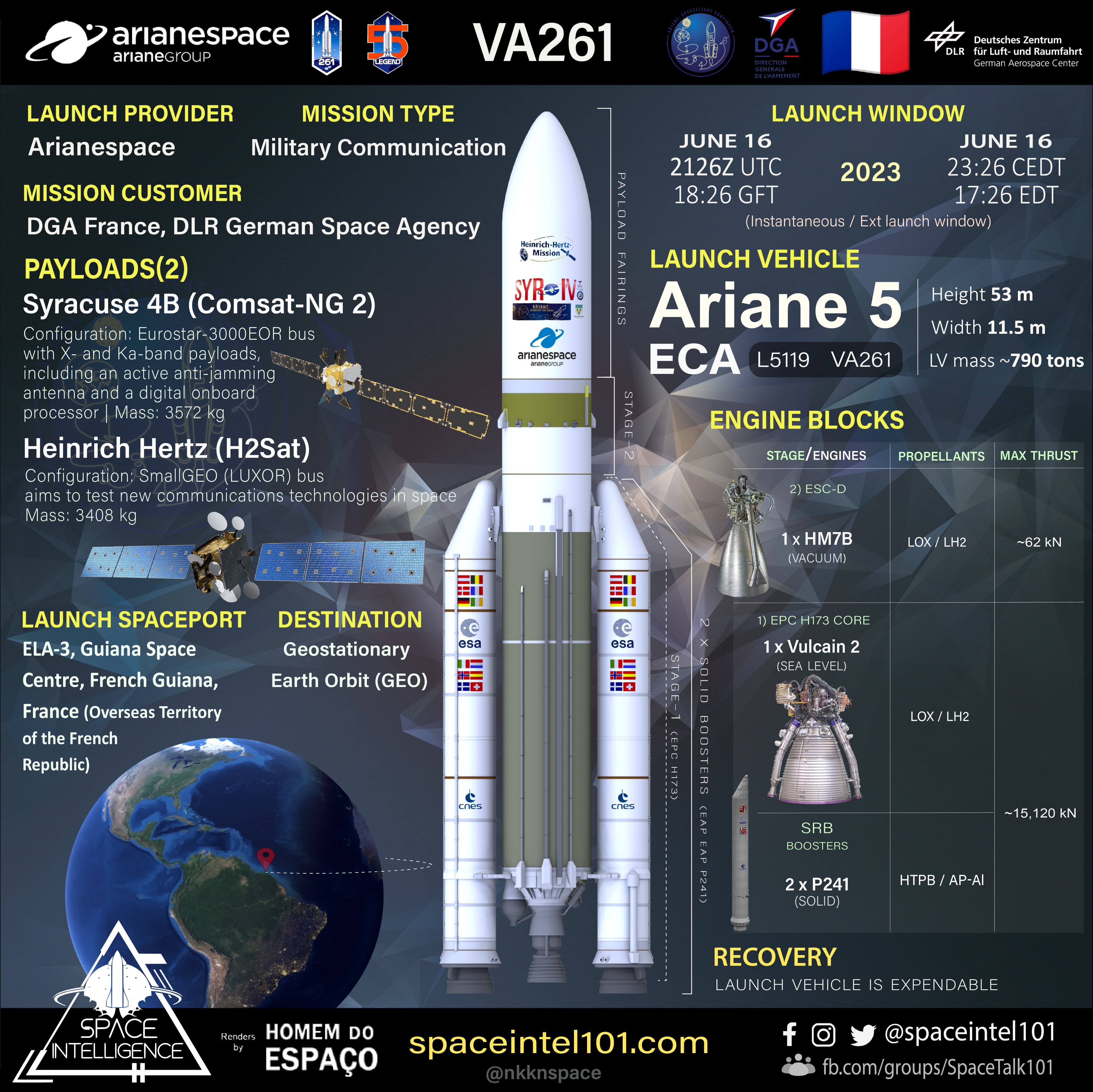
Agência Espacial Europeia (ESA)
Moderador: Conselho de Moderação
- cabeça de martelo
- Sênior

- Mensagens: 41142
- Registrado em: Sex Out 21, 2005 10:45 am
- Localização: Portugal
- Agradeceu: 1227 vezes
- Agradeceram: 3128 vezes
- cabeça de martelo
- Sênior

- Mensagens: 41142
- Registrado em: Sex Out 21, 2005 10:45 am
- Localização: Portugal
- Agradeceu: 1227 vezes
- Agradeceram: 3128 vezes
- cabeça de martelo
- Sênior

- Mensagens: 41142
- Registrado em: Sex Out 21, 2005 10:45 am
- Localização: Portugal
- Agradeceu: 1227 vezes
- Agradeceram: 3128 vezes
- cabeça de martelo
- Sênior

- Mensagens: 41142
- Registrado em: Sex Out 21, 2005 10:45 am
- Localização: Portugal
- Agradeceu: 1227 vezes
- Agradeceram: 3128 vezes
Re: Agência Espacial Europeia (ESA)
EU turns to Elon Musk to replace stalled French rocket
Brussels is looking to negotiate a ‘security agreement’ with US to keep its space program running.
BY JOSHUA POSANER AND LAURENS CERULUS
APRIL 17, 2023 5:40 PM CET
The European Commission wants to cut deals with private American space companies like Elon Musk's SpaceX to launch cutting-edge European navigation satellites due to continued delays to Europe's next generation Ariane rocket system.
In a draft request to EU countries seen by POLITICO, the Commission is planning to ask for a green light to negotiate "an ad-hoc security agreement" with the U.S. for its rocket companies to "exceptionally launch Galileo satellites.”
The Commission reckons only SpaceX's Falcon 9 heavy launcher and United Launch Alliance's Vulcan system are up to the job of sending the EU's new geo-navigation Galileo satellites — which weigh around 700 kilograms each — into orbit.
Seeking U.S. help to keep its flagship space program running puts a dent in the EU’s idea of strategic autonomy. Galileo is a point of pride for the EU, as it seeks to become less dependent on other regions for critical infrastructure, services and technology — a quest strongly backed by Paris.
The EU is having to seek assistance to launch new versions of its navigation satellites because the Ariane 5 rocket, developed by France-based ArianeGroup and launched from France's South American spaceport in French Guiana, is to be retired in the next months.
The deployment of its replacement, Ariane 6, has been delayed; the new system is currently expected to carry out a maiden launch at the end of this year, with full commercial deployment starting next year.
The alternative to the Ariane series would have been launching Galileo satellites with Russian-built Soyuz rockets, a version of which are also used at the French Guiana site. However, since Russia's invasion of Ukraine, two Galileo launches using Soyuz rockets have been cancelled, prompting the search for alternatives.
Galileo satellites beam highly accurate navigation and precise time data back to earth — and also provide a top secret encrypted service for use by government agencies. That means launches typically can only be carried out from EU territory under tight security rules.
"In view of the security sensitive information … included in Galileo satellites, an ad-hoc legally binding security agreement with [the] U.S. is necessary, in order to protect the integrity of the satellites and the Galileo constellation," said part of a draft proposal from the Commission seen by POLITICO.
It will be up to EU countries to approve negotiations for an agreement, which would come under the umbrella of standing deals on the exchange of classified information, the proposal states.
Capacity to launch satellites and humans into space independently of other powers has been a key part of French efforts to develop the concept of strategic autonomy for Europe.
But the need to contract out launches of critical space infrastructure to private companies operating in the U.S. undermines the argument that Europe is able to manage its own alternative to the U.S. GPS, Russia's Glonass and China's BeiDou constellations.
"Analyses are ... ongoing to ascertain whether or not launching with an alternative launch service provider would be feasible," said Commission spokesperson Sonya Gospodinova, adding that no decision has yet been taken. Assessments are being made on technical compatibility, launch site security and cost, she said.
While SpaceX's Falcon rocket is already operational, ULA only plans its first Vulcan mission in May.
The Paris-based European Space Agency, which isn't an EU institution but helps manage Galileo and runs the French Guiana spaceport, had already been looking at alternative launch options for satellites.
https://www.politico.eu/article/eu-elon ... satellite/
Brussels is looking to negotiate a ‘security agreement’ with US to keep its space program running.
BY JOSHUA POSANER AND LAURENS CERULUS
APRIL 17, 2023 5:40 PM CET
The European Commission wants to cut deals with private American space companies like Elon Musk's SpaceX to launch cutting-edge European navigation satellites due to continued delays to Europe's next generation Ariane rocket system.
In a draft request to EU countries seen by POLITICO, the Commission is planning to ask for a green light to negotiate "an ad-hoc security agreement" with the U.S. for its rocket companies to "exceptionally launch Galileo satellites.”
The Commission reckons only SpaceX's Falcon 9 heavy launcher and United Launch Alliance's Vulcan system are up to the job of sending the EU's new geo-navigation Galileo satellites — which weigh around 700 kilograms each — into orbit.
Seeking U.S. help to keep its flagship space program running puts a dent in the EU’s idea of strategic autonomy. Galileo is a point of pride for the EU, as it seeks to become less dependent on other regions for critical infrastructure, services and technology — a quest strongly backed by Paris.
The EU is having to seek assistance to launch new versions of its navigation satellites because the Ariane 5 rocket, developed by France-based ArianeGroup and launched from France's South American spaceport in French Guiana, is to be retired in the next months.
The deployment of its replacement, Ariane 6, has been delayed; the new system is currently expected to carry out a maiden launch at the end of this year, with full commercial deployment starting next year.
The alternative to the Ariane series would have been launching Galileo satellites with Russian-built Soyuz rockets, a version of which are also used at the French Guiana site. However, since Russia's invasion of Ukraine, two Galileo launches using Soyuz rockets have been cancelled, prompting the search for alternatives.
Galileo satellites beam highly accurate navigation and precise time data back to earth — and also provide a top secret encrypted service for use by government agencies. That means launches typically can only be carried out from EU territory under tight security rules.
"In view of the security sensitive information … included in Galileo satellites, an ad-hoc legally binding security agreement with [the] U.S. is necessary, in order to protect the integrity of the satellites and the Galileo constellation," said part of a draft proposal from the Commission seen by POLITICO.
It will be up to EU countries to approve negotiations for an agreement, which would come under the umbrella of standing deals on the exchange of classified information, the proposal states.
Capacity to launch satellites and humans into space independently of other powers has been a key part of French efforts to develop the concept of strategic autonomy for Europe.
But the need to contract out launches of critical space infrastructure to private companies operating in the U.S. undermines the argument that Europe is able to manage its own alternative to the U.S. GPS, Russia's Glonass and China's BeiDou constellations.
"Analyses are ... ongoing to ascertain whether or not launching with an alternative launch service provider would be feasible," said Commission spokesperson Sonya Gospodinova, adding that no decision has yet been taken. Assessments are being made on technical compatibility, launch site security and cost, she said.
While SpaceX's Falcon rocket is already operational, ULA only plans its first Vulcan mission in May.
The Paris-based European Space Agency, which isn't an EU institution but helps manage Galileo and runs the French Guiana spaceport, had already been looking at alternative launch options for satellites.
https://www.politico.eu/article/eu-elon ... satellite/
- cabeça de martelo
- Sênior

- Mensagens: 41142
- Registrado em: Sex Out 21, 2005 10:45 am
- Localização: Portugal
- Agradeceu: 1227 vezes
- Agradeceram: 3128 vezes
- cabeça de martelo
- Sênior

- Mensagens: 41142
- Registrado em: Sex Out 21, 2005 10:45 am
- Localização: Portugal
- Agradeceu: 1227 vezes
- Agradeceram: 3128 vezes
Re: Agência Espacial Europeia (ESA)
É hora de dizer adeus ao Ariane 5, o foguetão de uma geração e sem sucessor à vista
Previsto para esta terça-feira à noite, o último voo Ariane 5 foi remarcado para amanhã, mais de 25 anos e 117 voos depois do primeiro lançamento. O Ariane 6 está na linha de sucessão.
Tiago Ramalho
4 de Julho de 2023

É hora de dizer adeus ao Ariane 5, o foguetão de uma geração e sem sucessor à vista
Há toda uma geração que nunca ouviu falar de outro foguetão europeu. Em Junho de 1996, o Ariane 5 desiludiu na apresentação e explodiu 37 segundos depois da descolagem. Mas, cumprindo um provérbio certeiro na indústria aeroespacial, depois da tempestade veio a bonança. E, aqui, a bonança foram mais de 25 anos de lançamentos do foguetão europeu mais prolífico que já conhecemos: ao final da noite desta quarta-feira, o Ariane 5 retira-se ao descolar pela 117.ª vez do Centro Espacial de Kourou (Guiana Francesa). O último voo descola a partir das 22h28 (hora de Portugal continental).
 https://www.publico.pt/2023/07/04/cienc ... ta-2053382
https://www.publico.pt/2023/07/04/cienc ... ta-2053382
Previsto para esta terça-feira à noite, o último voo Ariane 5 foi remarcado para amanhã, mais de 25 anos e 117 voos depois do primeiro lançamento. O Ariane 6 está na linha de sucessão.
Tiago Ramalho
4 de Julho de 2023
É hora de dizer adeus ao Ariane 5, o foguetão de uma geração e sem sucessor à vista
Há toda uma geração que nunca ouviu falar de outro foguetão europeu. Em Junho de 1996, o Ariane 5 desiludiu na apresentação e explodiu 37 segundos depois da descolagem. Mas, cumprindo um provérbio certeiro na indústria aeroespacial, depois da tempestade veio a bonança. E, aqui, a bonança foram mais de 25 anos de lançamentos do foguetão europeu mais prolífico que já conhecemos: ao final da noite desta quarta-feira, o Ariane 5 retira-se ao descolar pela 117.ª vez do Centro Espacial de Kourou (Guiana Francesa). O último voo descola a partir das 22h28 (hora de Portugal continental).
- cabeça de martelo
- Sênior

- Mensagens: 41142
- Registrado em: Sex Out 21, 2005 10:45 am
- Localização: Portugal
- Agradeceu: 1227 vezes
- Agradeceram: 3128 vezes
- cabeça de martelo
- Sênior

- Mensagens: 41142
- Registrado em: Sex Out 21, 2005 10:45 am
- Localização: Portugal
- Agradeceu: 1227 vezes
- Agradeceram: 3128 vezes
Re: Agência Espacial Europeia (ESA)
Os vários programas para o futuro da ESA onde a bandeira Portuguesa aparece duas vezes.
- cabeça de martelo
- Sênior

- Mensagens: 41142
- Registrado em: Sex Out 21, 2005 10:45 am
- Localização: Portugal
- Agradeceu: 1227 vezes
- Agradeceram: 3128 vezes
- cabeça de martelo
- Sênior

- Mensagens: 41142
- Registrado em: Sex Out 21, 2005 10:45 am
- Localização: Portugal
- Agradeceu: 1227 vezes
- Agradeceram: 3128 vezes
- cabeça de martelo
- Sênior

- Mensagens: 41142
- Registrado em: Sex Out 21, 2005 10:45 am
- Localização: Portugal
- Agradeceu: 1227 vezes
- Agradeceram: 3128 vezes
- cabeça de martelo
- Sênior

- Mensagens: 41142
- Registrado em: Sex Out 21, 2005 10:45 am
- Localização: Portugal
- Agradeceu: 1227 vezes
- Agradeceram: 3128 vezes

